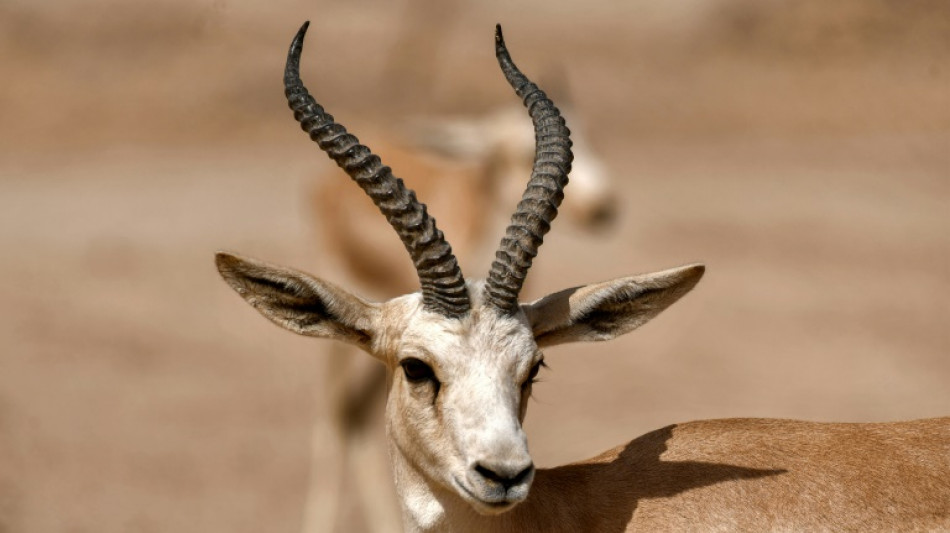
-
 Myanmar pro-military party claims Suu Kyi's seat in junta-run poll
Myanmar pro-military party claims Suu Kyi's seat in junta-run poll
-
Fed chair Powell says targeted by federal probe

-
 Trailblazing Milos Raonic retires from tennis
Trailblazing Milos Raonic retires from tennis
-
Australia recalls parliament early to pass hate speech, gun laws

-
 'One Battle After Another,' 'Hamnet' triumph at Golden Globes
'One Battle After Another,' 'Hamnet' triumph at Golden Globes
-
Japan aims to dig deep-sea rare earths to reduce China dependence

-
 Top UN court to hear Rohingya genocide case against Myanmar
Top UN court to hear Rohingya genocide case against Myanmar
-
US sends more agents to Minneapolis despite furor over woman's killing

-
 Trump says Iran 'want to negotiate' after reports of hundreds killed in protests
Trump says Iran 'want to negotiate' after reports of hundreds killed in protests
-
Bangladesh's powerful Islamists prepare for elections

-
 NBA-best Thunder beat the Heat as T-Wolves edge Spurs
NBA-best Thunder beat the Heat as T-Wolves edge Spurs
-
Ukraine's Kostyuk defends 'conscious choice' to speak out about war

-
 Trump says working well with Venezuela's new leaders, open to meeting
Trump says working well with Venezuela's new leaders, open to meeting
-
Asian equities edge up, dollar slides as US Fed Reserve subpoenaed

-
 Hong Kong court hears sentencing arguments for Jimmy Lai
Hong Kong court hears sentencing arguments for Jimmy Lai
-
Powell says Federal Reserve subpoenaed by US Justice Department

-
 Chalamet, 'One Battle' among winners at Golden Globes
Chalamet, 'One Battle' among winners at Golden Globes
-
Turning point? Canada's tumultuous relationship with China

-
 Eagles stunned by depleted 49ers, Allen leads Bills fightback
Eagles stunned by depleted 49ers, Allen leads Bills fightback
-
Globes red carpet: chic black, naked dresses and a bit of politics

-
 Maduro's fall raises Venezuelans' hopes for economic bounty
Maduro's fall raises Venezuelans' hopes for economic bounty
-
Golden Globes kick off with 'One Battle' among favorites

-
 Australian Open 'underdog' Medvedev says he will be hard to beat
Australian Open 'underdog' Medvedev says he will be hard to beat
-
In-form Bencic back in top 10 for first time since having baby

-
 Swiatek insists 'everything is fine' after back-to-back defeats
Swiatek insists 'everything is fine' after back-to-back defeats
-
Wildfires spread to 15,000 hectares in Argentine Patagonia

-
 Napoli stay in touch with leaders Inter thanks to talisman McTominay
Napoli stay in touch with leaders Inter thanks to talisman McTominay
-
Meta urges Australia to change teen social media ban

-
 Venezuelans await political prisoners' release after government vow
Venezuelans await political prisoners' release after government vow
-
Lens continue winning streak, Endrick opens Lyon account in French Cup

-
 McTominay double gives Napoli precious point at Serie A leaders Inter
McTominay double gives Napoli precious point at Serie A leaders Inter
-
Trump admin sends more agents to Minneapolis despite furor over woman's killing

-
 Allen magic leads Bills past Jaguars in playoff thriller
Allen magic leads Bills past Jaguars in playoff thriller
-
Barca edge Real Madrid in thrilling Spanish Super Cup final

-
 Malinin spearheads US Olympic figure skating challenge
Malinin spearheads US Olympic figure skating challenge
-
Malinin spearheads US figure Olympic figure skating challenge

-
 Iran rights group warns of 'mass killing', govt calls counter-protests
Iran rights group warns of 'mass killing', govt calls counter-protests
-
'Fragile' Man Utd hit new low with FA Cup exit

-
 Iran rights group warns of 'mass killing' of protesters
Iran rights group warns of 'mass killing' of protesters
-
Demonstrators in London, Paris, Istanbul back Iran protests

-
 Olise sparkles as Bayern fire eight past Wolfsburg
Olise sparkles as Bayern fire eight past Wolfsburg
-
Man Utd knocked out of FA Cup by Brighton, Martinelli hits hat-trick for Arsenal

-
 Troubled Man Utd crash out of FA Cup against Brighton
Troubled Man Utd crash out of FA Cup against Brighton
-
Danish PM says Greenland showdown at 'decisive moment' after new Trump threats

-
 AC Milan snatch late draw at Fiorentina as title rivals Inter face Napoli
AC Milan snatch late draw at Fiorentina as title rivals Inter face Napoli
-
Venezuelans demand political prisoners' release, Maduro 'doing well'

-
 'Avatar: Fire and Ashe' leads in N.America for fourth week
'Avatar: Fire and Ashe' leads in N.America for fourth week
-
Bordeaux-Begles rout Northampton in Champions Cup final rematch

-
 NHL players will compete at Olympics, says international ice hockey chief
NHL players will compete at Olympics, says international ice hockey chief
-
Kohli surpasses Sangakkara as second-highest scorer in international cricket


In a parched land, Iraqi gazelles dying of hunger
Gazelles at an Iraqi wildlife reserve are dropping dead from hunger, making them the latest victims in a country where climate change is compounding hardships after years of war.
In little over one month, the slender-horned gazelle population at the Sawa reserve in southern Iraq has plunged from 148 to 87.
Lack of funding along with a shortage of rain has deprived them of food, as the country's drought dries up lakes and leads to declining crop yields.
President Barham Saleh has warned that tackling climate change "must become a national priority for Iraq as it is an existential threat to the future of our generations to come".
The elegant animals, also known as rhim gazelles, are recognisable by their gently curved horns and sand-coloured coats. The International Union for Conservation of Nature classes the animals as endangered on its Red List.
Outside Iraq's reserves, they are mostly found in the deserts of Libya, Egypt and Algeria but are unlikely to number "more than a few hundred" there, according to the Red List.
Turki al-Jayashi, director of the Sawa reserve, said gazelle numbers there plunged by around 40 percent in just one month to the end of May.
"They no longer have a supply of food because we have not received the necessary funds" which had come from the government, Jayashi said.
Iraq's finances are under pressure after decades of war in a poverty-stricken country needing agricultural and other infrastructure upgrades.
It is grappling with corruption, a financial crisis and political deadlock which has left Iraq without a new government months after October elections.
"The climate has also strongly affected the gazelles," which lack forage in the desert-like region, Jayashi added.
- Barren soil -
At three other Iraqi reserves further north, the number of rhim gazelles has fallen by 25 percent in the past three years to 224 animals, according to an agriculture ministry official who asked to remain anonymous.
He blamed the drop at the reserves in Al-Madain near Baghdad, and in Diyala and Kirkuk on a "lack of public financing".
At the Sawa reserve, established in 2007 near the southern city of Samawah, the animals pant under the scorching sun.
The brown and barren earth is dry beyond recovery, and meagre shrubs that offer slight nourishment are dry and tough.
Some gazelles, including youngsters still without horns, nibble hay spread out on the flat ground.
Others take shelter under a metal roof, drinking water from a trough.
Summer hasn't even begun but temperatures have already hit 50 degrees Celsius (122 Fahrenheit) in parts of the country.
The effects of drought have been compounded by dramatic falls in the level of some rivers due to dams upstream and on tributaries in Turkey and Iran.
Desertification affects 39 percent of Iraqi land, the country's president has warned.
"Water scarcity negatively affects all our regions. It will lead to reduced fertility of our agricultural lands because of salination," Saleh said.
He has sent 100 million dinars (over $68,000) in an effort to help save the Sawa reserve's rhim gazelles, Jayashi said.
But the money came too late for some.
Five more have just died, their carcasses lying together on the brown earth.
R.Shaban--SF-PST




